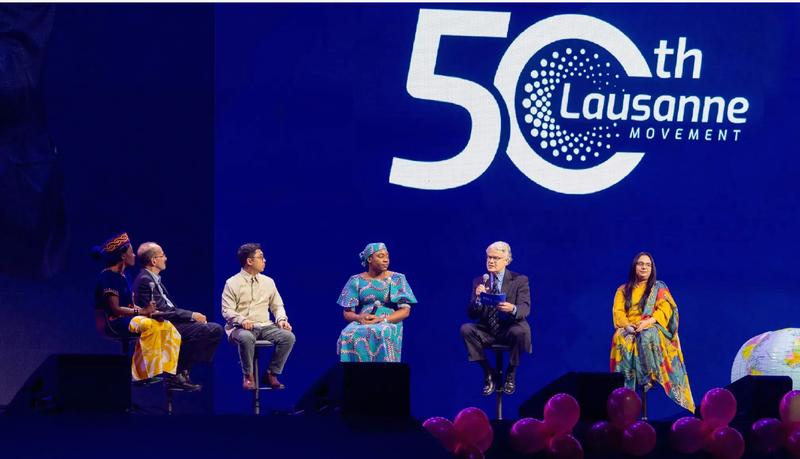
 Advent is the only church season which looks forward: to the return of our Lord Jesus Christ. It is somewhat difficult to quote Karl Barth these days, but he is right when he says “What other time or season can or will the Church ever have but that of Advent?[i] Advent is our perpetual season. We know Jesus has come, we know he will come again. It’s an appropriate season to reflect on my trip to the fourth Lausanne Congress (L4) in September 2024. The Lausanne Movement, beginning with the first congress in Lausanne in 1974 is around “uniting the global church around the unfinished task of the Great Commission.”[ii] Prior to L4 the Congress released the “State of the Great Commission” report, an in depth look at how the church is going on fulfilling the Great Commission. In the introduction it says “when the Great Commission is carried out with biblical faithfulness, it will lead to the worship of the King from all the nations of the world.”[iii] And is this not at the heart of living in Advent? We long both for the return of our King, and for all the world to rejoice when he comes again in power.
Advent is the only church season which looks forward: to the return of our Lord Jesus Christ. It is somewhat difficult to quote Karl Barth these days, but he is right when he says “What other time or season can or will the Church ever have but that of Advent?[i] Advent is our perpetual season. We know Jesus has come, we know he will come again. It’s an appropriate season to reflect on my trip to the fourth Lausanne Congress (L4) in September 2024. The Lausanne Movement, beginning with the first congress in Lausanne in 1974 is around “uniting the global church around the unfinished task of the Great Commission.”[ii] Prior to L4 the Congress released the “State of the Great Commission” report, an in depth look at how the church is going on fulfilling the Great Commission. In the introduction it says “when the Great Commission is carried out with biblical faithfulness, it will lead to the worship of the King from all the nations of the world.”[iii] And is this not at the heart of living in Advent? We long both for the return of our King, and for all the world to rejoice when he comes again in power.
I attended the Congress with the two fold goal of learning as much as I could, and having a chance to reflect on how the church I am at can continue to be missional, locally, globally and regionally. The rejoicing of the 5,000 brothers and sisters from all the world together was a reminder of the joy we have in the Holy Spirit together. That God has gone to all the nations, and that there are people who worship Him “from the very ends of the earth” (Acts 1:8). L4 was also a reminder that we all have much to trust in the Holy Spirit for. The report notes that “only three percent of international missionaries go to the unreached (who compose 40 percent of the global population). Thus, 97 percent of missionaries are sent to people who already have gospel access.”[iv] In Australia we are all aware of the declining number of people in most churches, and that much church growth is transfer growth.
The congress sought to recognise this and speak to this, with three key themes standing out to me:
- The need for the “whole gospel”.
- The need for repentance.
- An increased prayerful reliance on the Holy Spirit.
1. The need for the “whole gospel”.
The tagline for the entire Lausanne movement is “The Whole Church taking the Whole Gospel to the Whole World.” The theme for L4 was “Let the Church declare and display Christ together.” The Lausanne Covenant which came out of the first Congress, and largely produced by John Stott separated out “Evangelism” and “Christian Social Responsibility”.[v] Even including point 5 was controversial, and continues to be controversial to some people. David Claydon writes in the Autumn/ Winter 2021 edition of Essentials this paragraph was not in the original draft, and only inserted with John Stott’s full support, after Rene Padilla and Samuel Escobar raised concerns about this, and David Claydon along with others put that wording together.
For many people this has continued this understanding has been challenging. For some it is challenging because this goes too far towards a social gospel. For others, it does not go far enough, and to say that mission consists of two things is “saying that it is possible to have evangelism without a social dimension and Christian social involvement without an evangelistic dimension.”[vi]
I note this history (hopefully briefly!) to say that at L4 most speakers leaned heavily into the idea that the Gospel & mission intertwine evangelism and social involvement. From the CEO of Lausanne, Michael Oh’s, initial address, to nearly every plenary speaker, there was an emphasis on the “Whole Gospel”. That the Gospel needs to be declared and displayed.[vii]
2. The need for repentance
This came through strongly to me in two sessions: Sarah Breul, the Brazilian Executive Director of Revive Europe’s plenary, and a presentation of the history of the Korean Church on the penultimate night.[viii] Sarah Breul spoke to the truth that only God makes revival happen, but that we can “posture ourselves for it” and pray for it in these six ways:
- Travailing prayer: Gal 4:19
- Intercession through wordless groans: Romans 8:26
- Hebrews groaned in slavery: Exodus 2:23
- Hannah weeping: 1 Sam 1:12
- Jesus in Gethsemane
- We can ask Jesus to pour out this travailing prayer in our communities
And that this removes impediments with personal and corporate repentance. She explicitly mentioned that the narrative that the missionary movement just enabled colonialism is crippling western movements. She said we need them at the table. That the Global North might be tempted to have control. And that Global South might be tempted to do things independently, but that God is building one church. We are his bride and we have been grieving him. We need to repent from corruption, from abuse and from a lack of unity.
The presentation on the history of the Korean church struck me that twice in the history of the Korean church, once before WWI and once post WWII Korean church leaders came together and repented. For various things, but especially for a lack of unity in working together for the Gospel. I know the Australian church has worked together, but have leaders ever come together to repent for our attitudes towards each other? And where our disunity has turned people away from the good news of Jesus Christ?
3. An increased prayerful reliance on the Holy Spirit
This stood out in many of the talks and sessions, but especially in the Rev Dr Femi B Adeleye, the Director of Langham Preaching Africa’s plenary. Acts was the book the morning plenary speakers spoke from, so it was an appropriate theme. As Dr Adeleye reminded us that Acts is not just about the doings of the Apostles, but about the Holy Spirit. That revivals began with prayer, and waitingon the Holy Spirit. He listed a number of Biblical and historical revival examples. He especially challenged “Those of us who believe in the work of the Holy Spirit but tend to sideline him by a mindset that depends primarily on modern management techniques, abundant finances, sufficient HR, statistics as measure of growth and impact, and the like, need to repent and depend on the Holy Spirit.”[ix]
There is much that I could write on, that I do not have space for. That there continue to be challenges for the global church in working together missionally, especially amongst evangelicals, and Pentecostals, was also clear at the Congress. Many were upset that the Statement for this Conference was released completed, with no opportunity for feedback.
In the Korean protestors outside who felt that the Lausanne movement is too inclusive of different churches, and that its perspective on homosexuality too liberal, demonstrating that even amongst Christians who are orthodox on the issue of marriage (as Lausanne is) find doctrinal issues that make it hard to work together. In the public apology the Congress sent out for Ruth Padilla DeBorst’s talk where she (very mildly) critiqued dispensationalist theology and expressed support for those suffering in Gaza, and then subsequent sending out of an open letter from her.[x]
The ecumenical attitude of the bishops at Lambeth in 1968 expresses the hope many evangelicals have: “that whatever can be done together should be done together.”[xi]
L4 demonstrated that we are still struggling, even where there is much doctrinal and cultural alignment, to work out what we can actually do together. It is not that insightful to observe that this will continue to be a significant challenge, even in Australia.
I found attending the L4 congress a blessing. I’m thankful for the invitation, and those who supported me financially to attend. I do feel that those three themes are significant and worth reflecting on for us here in Australia.
Tim Collison is the Assistant Minister at St Mark’s Camberwell, and the Secretary of EFAC Australia. He's passionate about people understanding how God is already working in their lives. In his spare time he enjoys reading and digesting trivial facts.
[i] Dogmatics (IV/3.1).
[ii] Lausanne.org/our-history, accessed 23/10/2024
[iii] State of the Great Commission, p.6. The Introduction also notes, rightly, that it is only the last 150 years or so that the Great Commission has been considered missional, rather than ecclesiological.
[iv] State of the Great Commission, p.15
[v] Points 4 & 5 respectively of the covenant. , accessed 23/10/2024
[vi] Bosch, Transforming Mission, p.405. This comes from a specific critique in the book of the Lausanne Covenant.
[vii] For obvious reasons (Dr Porter gave me a word limit), I cannot mention every speaker who said this. But you can watch many of the plenary sessions by going to Lausanne.org/accelerate or if reading is more your speed you can access all 20,000~ words of my notes at https://bruderreden.substack.com/p/lausanne-congress-day-7. No need to subscribe to my substack, just scroll to the bottom of my post and you’ll see a link to download my full notes.
[viii] The presentation “The Twelve Stones of the Korean Church” can be watched here: https://www.youtube.com/watch?v=U5yzpFbWgeI
[ix] From my notes. Cf footnote vii
[x] Gordon Preece has a more comprehensive article on this at ethos. http://www.ethos.org.au/online-resources/Engage-Mail/israel-palestine-and-lausanne-iv
[xi] Hocking, A Handbook of Parish Work, p.127
